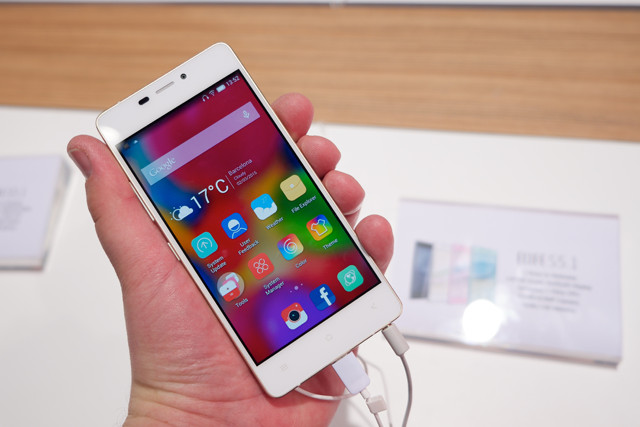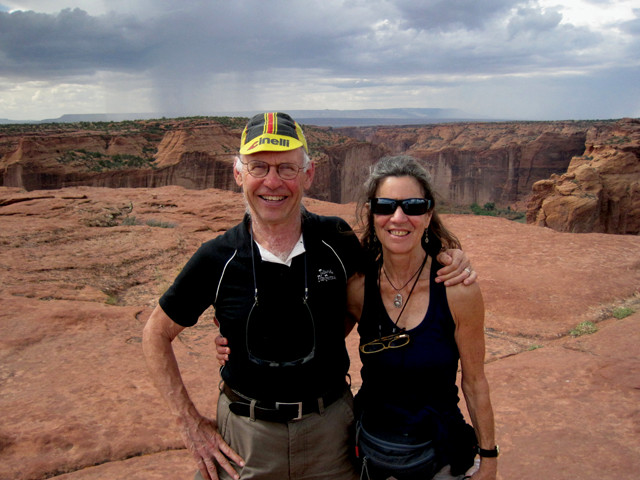
by Fred Schwab Thursday, October 20, 2016

Credit: Kārlis Dambrāns, CC BY 2.0.
My desire to postpone mental aging by writing Geologic Columns for EARTH got me thinking about the impact of the digital revolution. Our compulsion for constant connection is troubling. A recent road trip to several western national parks with my device-addicted wife underscored the problem. Claudia was often an ethereal presence, compulsively uploading photos of Zion’s cliffs and the rim of the Grand Canyon. She lived in a separate world, emailing shots to friends and family. I was culpable too, agreeing to sneak away from our rim-side cabin, desperate for available Wi-Fi 5 kilometers away.
The digital revolution has positive qualities: wider interconnectedness, improved communication, and increased access to information, among them. But there are drawbacks too. We’re overloaded with data and socially isolated.
A piece in the New York Times last year by author and MIT professor Sherry Turkle — “Stop Googling. Let’s Talk” — struck a chord. She noted that online connectivity over the past three decades has made conversation lighter, perfunctory and superficial. Empathy, understanding and even eye contact among kids and young adults have declined. Just walk through the corridors at scientific meetings or look around in restaurants and you’ll see people staring hypnotically at their screens. In her book “Reclaiming Conversation,” Turkle argues that self-reflection and humanity decline thanks to this electronic erosion.
Turkle considers mobile phones (and tablets) not just accessories, but devices that fundamentally change who we are and what we do. We become digital zombies mesmerized by small screens. Face-to-face interaction crucial for negotiating, for reading one another’s emotions, and for dealing with complex issues, is diminished by constant digital communication, she wrote in another book called “Alone Together.”
A survey of 2,000 smartphone users across the U.S. conducted by Dignity Health found that people checked their smartphones an average of 134 times per day. Half (and 78 percent of the 18- to 19-year-olds) check in just before sleeping. Physician and Dignity Health Vice President Gary Greensweig has said that reaching for our mobile phone has become a nervous habit. Eschewing cellphones to converse or simply reflect on the day, the surroundings, or one’s sense of self and purpose reduces stress and engenders contentment. Overuse damages health (tired eyes, stiff necks, sore wrists and fingers), leads to clumsiness, and harms personal relationships with nature and other people.
There is an alarming surge in mobile device usage. A Yahoo executive provided data showing that smartphone and tablet users in the United States spend close to four hours daily (up 35 percent from a year ago) on their handheld devices (this is separate from computer use). This is discouraging, but a recent study published in Perspectives on Psychological Science showed that teenagers, despite obsessive use of mobile devices, retain close personal friendships despite their urge to communicate constantly online. Perhaps youngsters have adapted so well to the technology that they can use it without unduly disrupting their lives. Maybe it’s just us adults who are unable to break free of our devices. Then again, even Steve Jobs realized the value of family conversations. He barred tablets and smartphones at the dinner table!
Other recent studies have shown, however, that getting offline and spending solitary time in natural settings, far from urban centers and technology, has tremendous benefits for the brain. Gregory Bratman and colleagues from Stanford University wrote in Proceedings of the National Academy of Sciences that neural activity (indexed by blood flow) decreased in that portion of the brain associated with rumination (that is, negative emotions such as depression) when participants walked alone in nature without electronic devices. In addition, working memory improved and anxiety decreased.
Can we cure ourselves? I recently read about a useful app called BreakFree that allows users to measure their smartphone use and enables “addicts” to disable the internet and send text messages automatically. A second app called Moment clocks smartphone usage by the minute and can install pop-up warnings of user-agreed-upon excessive use, even triggering shut-offs.

Fred Schwab and his wife Claudia Credit: Claudia Schwab.
I regularly experience the tangible and intangible benefits of completely withdrawing from the digital universe when I do fieldwork, explore a national park, or sit face-to-face with a glass of Beaujolais Nouveau. But I also spend a lot of time online — for instance, rereading old newspaper columns to remind myself what had been said before writing this column!
But I am rediscovering the off switch on my computer and I remain determined not to own a smartphone. I frequently withdraw from the web, social media and 24/7 news updates. Will Claudia join me? Or, after 52 years of marital bliss, will she seek a better match online?
© 2008-2021. All rights reserved. Any copying, redistribution or retransmission of any of the contents of this service without the expressed written permission of the American Geosciences Institute is expressly prohibited. Click here for all copyright requests.